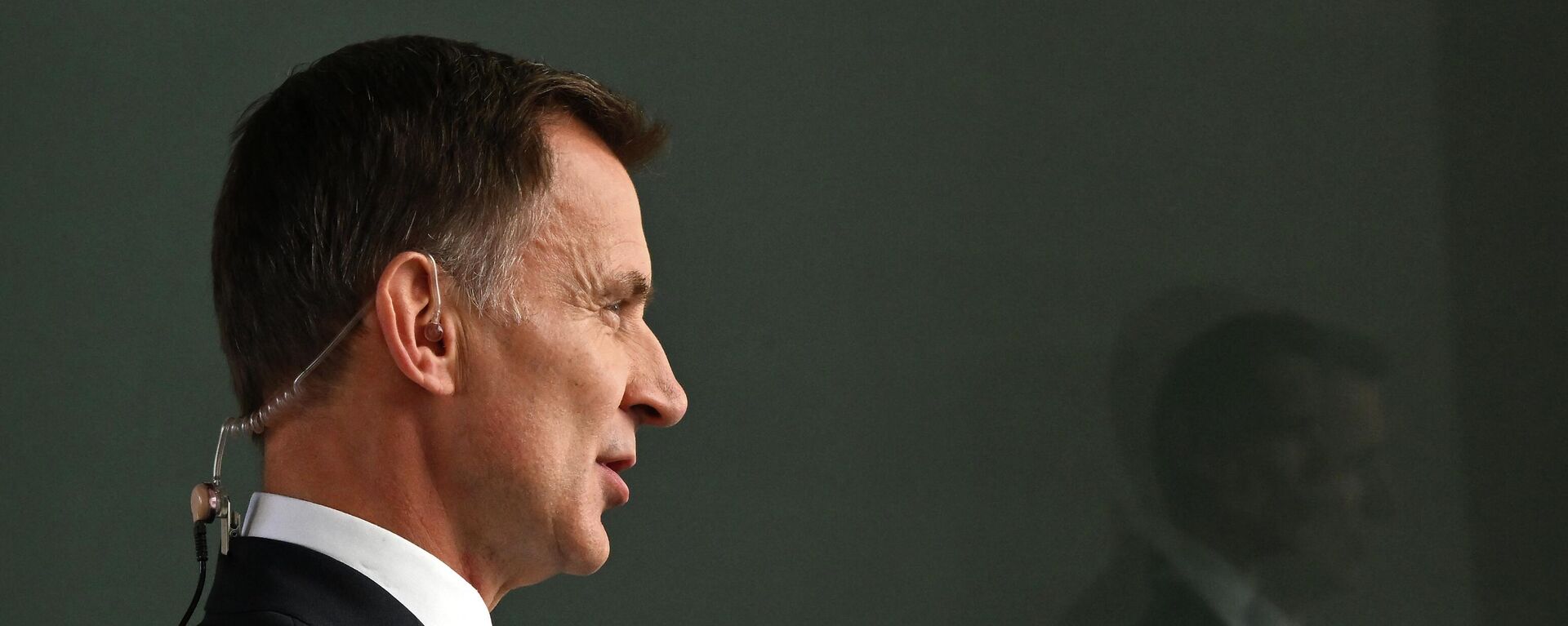UK Chancellor Reverses Tax Cuts, Vows to Review Energy Support Plan
10:21 GMT 17.10.2022 (Updated: 15:21 GMT 28.05.2023)

© AP Photo / Alberto Pezzali / British Chancellor of the Exchequer Jeremy Hunt leaves 10 Downing Street after being appointed by Prime Minister Liz Truss
Subscribe
Prime Minister Liz Truss appointed Jeremy Hunt as chancellor on Friday — hours after forcing his predecessor Kwasi Kwarteng's resignation following market turmoil prompted by his implementation of her economic policy promises in his September mini-budget.
The new British chancellor of the exchequer has ditched the government's most popular policies — to appease financial markets and the White House.
Speaking at a Whitehall press conference on Monday morning, Jeremy Hunt announced the latest U-turns on his predecessor Kwasi Kwarteng's September 23 mini-budget.
"The most important objective for our country right now is stability," Hunt declared.
The changes included clawing back the cut in the basic rate of Income Tax from 20 to 19 per cent and cancelling the freeze in alcohol duty — a move that had been welcomed by struggling pubs and restaurants.
Chancellor Jeremy Hunt scraps plans to cut the basic rate of income tax from 20p in the pound to 19p from April next year
— BBC News (UK) (@BBCNews) October 17, 2022
He says "it is not right" to borrow to fund the tax cuthttps://t.co/N7DeKJDt85 pic.twitter.com/9a2p2d3OoD
But most ominously, Hunt announced that the centrepiece Energy Price Guarantee scheme to cap soaring gas and electricity bills could be cut after just six months — rather than the two years pledged by Prime Minister Liz Truss last Wednesday.
The Chancellor said the Treasury would "review" the scheme to help households and businesses in April 2023, insisting that "It would not be responsible to continue exposing public finances to unlimited volatility in international gas prices."
"The objective is to design a new approach that will cost the taxpayer significantly less than planned, whilst ensuring enough support for those in need," Hunt said. "Any support for businesses will be targeted to those most affected and the new approach will better incentivise energy efficiency."
New chancellor announces review of energy bills help from April
— BBC News (UK) (@BBCNews) October 17, 2022
"It would not be responsible to continue exposing public finances to unlimited volatility in international gas prices," Jeremy Hunt sayshttps://t.co/JlPOooKRr0 pic.twitter.com/u7W9EHNbBg
Also for the chop were cuts to the tax on share dividends — one of several measures in the mini-budget seen as benefitting the wealthiest — along with VAT-free shopping for tourists and easing of IR35 rules for the self-employed.
Hunt said he had cleared the policy announcement to the media before informing Parliament with Speaker Sir Lindsay Hoyle "to reduce unhelpful speculation" as the stock and currency markets opened in the City of London.
Kwarteng's announcement of massive government borrowing to pay for the energy price cap in his mid-year spending review, coupled with tax cuts pledged by Truss during her summer campaign for the Conservative Party leadership, prompted a run on the pound and government bonds known as 'gilts'.
The mini-budget came under fire from US President Joe Biden's administration, while the Bank of England's response of a half-point interest rate rise caused more chaos as mortgage lenders withdrew a swathe of fixed-rate deals.
Former foreign secretary Hunt was appointed chancellor on Friday after Kwarteng resigned at the request of Truss — who then reversed the decision to cancel six-point rise in Corporation Tax, set to come in next April.



